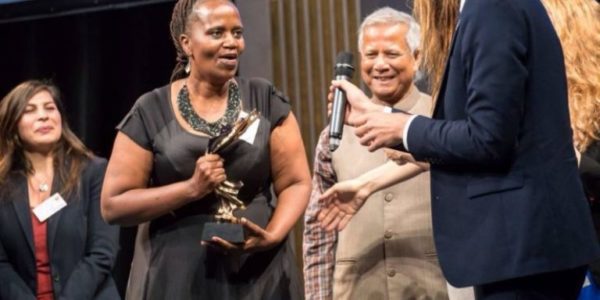When all hope seemed lost, 51-year-old Nonhlanhla Joye literally started farming in plastic bags. She is the founder and director of the Umgibe Farming Organics and Training Institute.
“I hated farming when I was a child. While all the other kids my age were running around and playing, I was in my father’s backyard helping him tend his farm,” proclaims the 51-year-old award-winning farmer from Cato Manor, just outside Durban in KwaZulu-Natal, Republic of South Africa.
However, as her life was turned upside down with a potentially terminal cancer diagnosis in 2014, she was faced with no choice but to adapt and return to farming, the only other thing she knew. Her diagnosis disabled her to the extent that she lost almost everything, including her job and the ability to feed her family.
“My father insisted that I would not be part of a generation of beggars. And, because it was never in me to ask for any help from anyone, I started a food garden of my own in my backyard,” says Joye who was forced to adapt though the garden was a failure because all the produce was being eaten by stray chickens.
At her weakest, when all seemed lost during chemotherapy, Nonhlanhla Joye innovated. She built wooden structures upon which she would grow her produce in plastic packets at a height the delinquent chickens couldn’t reach.

What happened next was the beginning of an odyssey that would see her rise to fame as one of agriculture’s most decorated achievers, and a pioneering force in the socio-economic empowerment of KwaZulu-Natal, with her influence reaching as far as the northern regions of the province.
She says, “I noticed that not only was I growing vegetables in surplus (in the plastic packets), I was also saving a lot of water.”
Following this, she was not only able to feed herself, thereby regaining enough strength to help force her cancer into remission; she was also able to grow a small business by selling excess produce to neighbours. Moreover, as people sought out her organically grown vegetables, curiosity in her model of farming grew rapidly.
Inspired by this interest, she then sought out land where she could implement what is now known across the eThekwini region as the “Growth System”. Yet again, Joye was forced to adapt. The land she was given by the municipality, once earmarked as an agricultural site, had become a dump site. With just R400 to her name, and the help of women who would later become equity partners in one of her two cooperatives, she raised from scratch a smallholding from which at least ten other farmers operate. It provides a platform to hundreds of farmers in her hometown of Chesterville (between Cato Manor and Westville, some 13km west of Durban) and beyond.
Her now patented Growth System has opened doors of opportunity to organic farmers. She has sold the system to over 50 cooperatives, which include an estimated 600 people.
Furthermore, she not only provides technical advice and support to these cooperatives. She collects and delivers their produce to various buyers and markets in return for only a transport fee. In addition, her enterprise is fiercely dedicated to developing her community through training in organic farming, crop production and food processing.
From an initial R400 to her name, Nonhlanhla Joye’s Umgibe Farming Organics and Training Institute has seen a turnover of more than R1 million just last year – a jaw-dropping achievement given that the business has only been in existence for four years. Her accolades include the global Impact² Woman Entrepreneur of the Year Award, which she received in Paris, France. It was one of 11 awards she won in 2017 alone.
Though she is not shy of her achievement, Joye insists that her bank account is not the truest barometer of her success. She is most proud of the fact that she’s raised herself from death’s door, adapted to every circumstance thrown her way and, ultimately, through her business provided a sustainable source of income to nearly 500 families.
This becomes even clearer when asked what has driven her success. “My interest in social development has always been a driving force in my life. It’s the thing that makes my heart beat.”
This story was originally published by Food For Mzansi.


Permalink
Just another proof that women, despite discouragement, and hardship are capable of great deeds even without charity or official help. Just imagine what we could do if the male establishment would get out of our way!
Permalink
Like!! I blog frequently and I really thank you for your content. The article has truly peaked my interest.